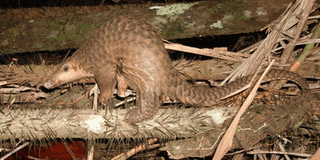Pangolin existence under threat

The humble pangolin locally known as olugave is the world’s most trafficked mammal. File photo
What you need to know:
The demand for the scales of the pangolin, commonly known as Olugave in Luganda dialect, is threatening the existence of the animal.
Pangolins were until recently some of the most common mammals in Africa, particularly Uganda. The small squirrel-size mammals mostly live in hollow trees, while others dig tunnels underground, to a depth of 3.5 metres.
To people who spend some time in gardens, pangolins are common species because they always frequent tilled land looking for insects to feed on.
They have big scales that are as hard as ivory or rhino horn known in Luganda as Olugave. Because pangolins are not harmful to man or crops, most people ignore them with the exception of some Baganda who regard the little animals as totems, making them respected by those people.
To wildlife enthusiasts, pangolins are great animals because of their rare character that makes them tend toward shyness when they come across people. They will never look at a person directly and will run away at the slightest opportunity.
In some cultures, pangolins are hunted for meat and rated among the most popular delicious bush meat types.
The animals were in November 2010 added to the Zoological Society of London’s list of genetically distinct and endangered species because their scales can be used as jewellery, ornaments, traditional medicines and hand-held weapons.
In Uganda, other than hunters who want them for their bush meat and people who consider them as totems, many people may not know much about these animals.
Mr James Busanani, who hails from Kisoro, was working at Tropical Fish Industry until recently when he joined a more thriving business selling pangolin scales to Ugandan businessmen that in turn supply them to rich Chinese businessmen.
Busanani claims that he was receiving deliveries from Gulu, Mbarara, Democratic Republic of Congo, Fort Portal, Mukono and several other places.
“I buy a kilo at Shs50,000, and sell it to the Ugandan middlemen at Shs100,000,” he said in a statement he recorded at Kira Police Station.
He had made the business his source of livelihood until his luck run out last week when Uganda Wildlife Authority enforcement operatives arrested him along Entebbe Road delivering 115kg of pangolin scales to a Chinese businessman.
“Lately, they have found a very lucrative market in Asia and informers have said that some Chinese in Uganda buy the pangolin scales and ship them to Asia because they are sold at $1,000 per kilo on the international market,” Ms Lilian Nsubuga, UWA’s public relations manager, notes.
She says the population of pangolins in Uganda is not known as they are found in many parts of the country but the lucrative market for pangolin scales in Asia and Europe is increasing.
“Because of the small nature of the animals, one would need to kill at least five pangolins to get one kilo of pangolin scales. This means that in order to have 115kgs of pangolin scales that Busanani was arrested with, about 575 pangolins were killed showing the extent the animals are facing extinction if nothing is done to save the situation”, she adds.
Ms Nsubuga says the suspect was taken to Kira police station to face charges of being in possession of wildlife species.
Section 75 of the Uganda Wildlife Authority Act says a person in possession of wildlife life faces a punishment of a Shs1m fine or imprisonment not exceeding five years or both if found guilty.




